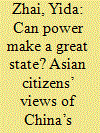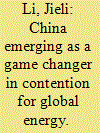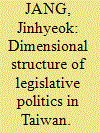| Srl | Item |
| 1 |
ID:
143614


|
|
|
|
|
| Summary/Abstract |
With its rapid economic growth, China has become the second largest economy. At the same time, a rapid increase in its defense expenditure and expanding maritime ambitions have raised concerns among other Asian nations. Moreover, by displaying its economic and military might China’s recent assertive actions in the East China Sea and South China Sea seem to “prove” longstanding worries regarding China’s threats. This article reviews the traditional Chinese philosophy of the great state and argues that China unfortunately deviates from it. Cross-national survey data show that Asian citizens widely acknowledge the rising power of China. Nevertheless, an expansion of economic and military power fails to yield more positive evaluations. The country’s pursuit of power and blunt foreign policy push neighboring states to welcome an expansion of Japan’s military role and to intensify their security ties with the United States to achieve a balance of power. There needs to be a shift in China’s foreign policy to earn trust and respect from its Asian neighbors. Power can create a hegemon but it definitely will not make China a great state
|
|
|
|
|
|
|
|
|
|
|
|
|
|
|
|
| 2 |
ID:
143612


|
|
|
|
|
| Summary/Abstract |
China’s rise as a global power features its unyielding contention with the West for domination in the world system. Such contention manifests itself conspicuously in the control of global energy governance as China has a more urgent need to secure its energy supply to sustain its economic growth. Viewed in a historical perspective, in the arena of global energy politics and markets, China has incrementally evolved through the stages of development from starting as a passive rule-conformist to later becoming an assertive challenger and ultimately a game changer. The year 2008 was seemingly a turning point for the rise of “China Inc.” as the financial crisis that swept across the West provided an unprecedented opportunity for China to march into the resource-rich regions of the world without encountering much resistance from its contenders. What is worth noting is that China’s market expansion was spearheaded by its unique state-owned energy corporations that carried out business strategies almost unrivaled by its western counterparts. China’s intention to change the rules of the game in global energy governance can also be seen in its ongoing efforts to construct an alternative normative structure and institutional means to undermine the Western dominion.
|
|
|
|
|
|
|
|
|
|
|
|
|
|
|
|
| 3 |
ID:
143615


|
|
|
|
|
| Summary/Abstract |
This paper provides an overview of the dimensional structure of bill cosponsorship networks in the Legislative Yuan from 1992 through 2012. This paper’s exploratory analysis presents two empirical findings. First, about one-fifth of the legislators’ bill cosponsorship activities can be explained by the Pan-blue vs. Pan-green cleavage. Second, the other dimensions are mainly responsible for the minor party members, who want to differentiate themselves from the two major parties, namely, the Kuomintang and the Democratic Progressive Party
|
|
|
|
|
|
|
|
|
|
|
|
|
|
|
|
| 4 |
ID:
143616


|
|
|
|
|
| Summary/Abstract |
Track II diplomacy is of specific strategic interest for Taiwan under the barriers of participation in international organizations and the formationof diplomatic ties with major powers. The Taipei-Seoul Forum/Seoul-Taipei Forum (TSF/STF), which was inaugurated in the early 1990s worked as an important example of how track II diplomacy can contribute to Taiwan’s relations with South Korea based upon interpersonal relationships and links between think tanks on either side. This paper examines the development of TSF/STF to examine the opportunities for and constraints on track II diplomacy efforts to nurture bilateral relations between Taiwan and South Korea. Through the lens of social capital as an analytical framework, this paper portrays the unique process of interpersonal social networking that takes place through TSF/STF, which has managed to preserve a fragile bilateral relationship during a period of extreme difficulty.
|
|
|
|
|
|
|
|
|
|
|
|
|
|
|
|
| 5 |
ID:
143613


|
|
|
|
|
| Summary/Abstract |
This paper uses the case of Sino-Southeast Asian relations to gain insights into China’s ability to muster support for its global agenda. The analysis focuses on the regional-global nexus of interstate relations and explores the extent to which the quality of two states’ regional relations influences the likelihood of behavioral alignment in global politics. To this end, we consider a range of potentially influential aspects of Sino-Southeast Asian relations such as the quality of bilateral relations based on recent event data, economic ties and regime similarity as well as measurements of countries’ external alignments and national development levels. We employ a statistical model to search for correlations of these factors with observed trends of voting coincidence in the United Nations General Assembly during the period 1980-2014. We find a strong correlation between the quality of regional bilateral relations and global policy alignment, which indicates that patterns of regional cooperation and conflict impact the trajectory of China’s rise in world affairs
|
|
|
|
|
|
|
|
|
|
|
|
|
|
|
|